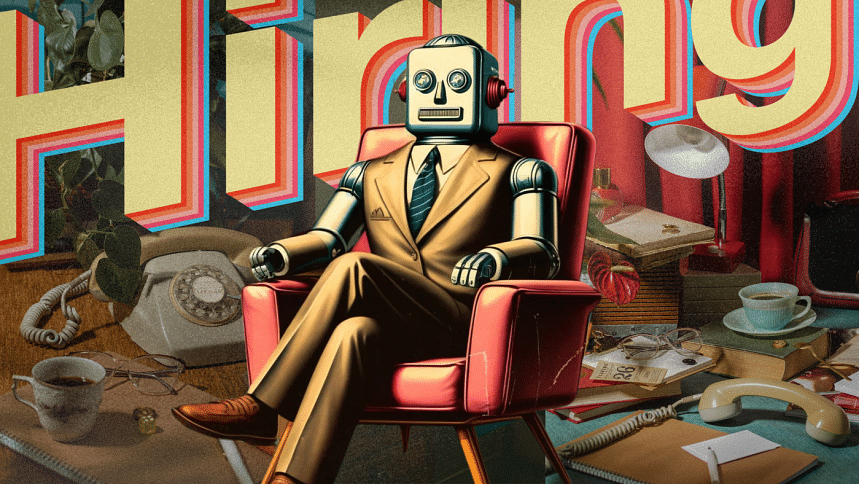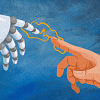Looking to get hired? You may have to fight it out with AI first

The advent of artificial intelligence (AI) in the hiring process has ushered in an era of both promise and peril. As employers and job seekers adapt to increasingly sophisticated AI tools, the landscape of recruitment is undergoing a profound transformation, raising essential questions about fairness, efficiency, and the future of work.
AI in recruitment: A double-edged sword
Recent technological advancements have significantly changed recruitment dynamics. Companies like iCIMS now serve approximately 3 million users, including a quarter of the Fortune 500, utilising AI to match job seekers with roles effectively.
A survey by the Society of Human Resource Management found that 25% of HR departments currently use AI, with expectations to double by next year. This rapid adoption is mirrored by job seekers' increased use of AI, with tools like Resume Builder reporting that about 50% of job seekers utilised AI for resume and cover letter creation early last year, a figure that is likely higher today.
AI-driven processes, designed to manage and analyse vast amounts of data, offer the allure of removing human bias from hiring decisions. However, they also risk perpetuating existing prejudices embedded in historical data.
The impact on job seekers
For job seekers, AI in recruitment can feel like a gatekeeper. While some leverage AI to tailor proposals and resumes, others encounter barriers. In some reported cases, AI-generated applications resulted in callbacks despite inaccuracies. This underscores the potential pitfalls of relying heavily on automated systems.
Moreover, the growing trend of "ghosting", where candidates apply en masse without genuine interest in positions, has prompted employers to tighten their screening processes, making the hiring landscape even more competitive and impersonal.
Despite AI's potential to streamline recruitment, there is substantial concern over its propensity to perpetuate existing biases. A study by Harvard Business School revealed that over 90% of employers rely on software to filter applicants, potentially embedding historical prejudices into AI algorithms. Furthermore, a 2023 report from the American Staffing Association Workforce Monitor indicated that 34% of people view AI hiring tools as more prone to bias than human recruiters.
Seeking a human touch
Amidst the efficiency of AI-driven recruitment, a longing for human connection persists. Both employers and candidates increasingly value direct interactions, which often provide deeper insights than automated processes can offer. This shift is partly driven by the realisation that AI, while powerful, cannot fully appreciate the nuances of human experience and soft skills that are crucial for many roles.
Data from LinkedIn shows a 6% increase in the number of job applications per seeker year over year, which may reflect the dehumanising effect of automated systems. This has prompted a counter-movement towards more personalised recruitment approaches.
According to ZipRecruiter's Chief Economist, employers are increasingly seeking face-to-face or direct video interactions to "weed out the weakest candidates," revealing a preference for human judgement despite AI's prevalence.
Regulatory and ethical considerations
The legal framework surrounding AI in hiring is still evolving. With initiatives like the U.S. Equal Employment Opportunity Commission's strategic enforcement plan focusing on AI's impact, there is a push towards ensuring that these tools do not inadvertently disadvantage protected groups.
In contrast, in Bangladesh, such practices are still at a nascent stage. There is a pressing need for serious conversations and actions towards regulating AI in hiring to prevent biases and ensure fairness, mirroring the proactive measures seen in other parts of the world.
As organisations navigate these waters, the need for transparent and fair AI applications in recruitment becomes apparent. Employers must critically assess AI solutions, ensuring they do not simply replicate past inequities under a veneer of innovation.
The road ahead
The integration of AI in hiring is a testament to the relentless march of technology across all sectors. However, this progress must be tempered with a commitment to equity and transparency. As AI becomes a staple in recruitment, continuous evaluation and adaptation of these tools are essential to ensure they serve the broader goals of fairness and efficiency in the job market.
While AI presents significant advantages in handling the complexities of recruitment, its role should be viewed as supportive rather than definitive. Balancing technological innovation with human judgement remains key to a fair and effective hiring process.

 For all latest news, follow The Daily Star's Google News channel.
For all latest news, follow The Daily Star's Google News channel. 








Comments